Haim Watzman
The field school guide leads us along a path that skirts ripening stalks and ascends a low hill. The air is still, heated from above by a sun unseen through a dusty haze. At the top I count my family. Ilana is right behind me; my youngest, Misgav, stands next to the guide, looking out on the plain. I hold out my hand to take Niot’s, closing my fingers around a void. He is gone. I turn and see him running, running through the wheat.
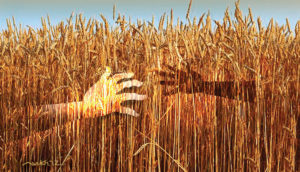
Niot had a habit of running off, not in exuberance, like a dog released from a leash, but in fear. Once, when our dentist took out the set of pointy and shiny tools with which he used to probe mouths, Niot leapt from the chair, whizzed out of the clinic and the building. It took twenty minutes for me, the dentist, the hygienist, and his older brother to ambush him and bring him back. His teeth were not examined.
This time, however, there is no reason for fear. We are having a good time and he is getting along with the other kids. Just a few minutes before he had been singing at the top of his lungs. When I call out to him, he does not turn. I lope down the hill, at a canter, so as not to incite him to go any faster. But as I descend, the wheat stalks, taller than he, hide him. Now it is I who am frightened. Who knows what he will do—find his way to the road on the other side of the field, fall into a pit, encounter a scorpion or dangerous stranger.
In the years since Niot left us forever, I also pursue him, but not so fast as to incite him to run faster. I live in fear that I will lose sight of him, that he will disappear beyond my mind’s horizon. How can that be? Five years after his death, I think of him constantly. But the wheat conceals him.
The commonplace is that life goes on, and like all commonplaces, it is true in part. I have Ilana, three other children, work. I read, write, study, go to the theater, to concerts, classes, hang out with friends, crack jokes. I don’t often have a free evening. But all this against a fundamental background of sadness, of loss. Life is not bleak, far from it, but the empty space inside remains. That is, it is not empty, because that is where Niot is, and that is why I do not want that empty space to heal. But it seems so vulnerable, that vacuum. As if the emptiness could vanish and Niot disappear.
I think I hear the breaking of wheat stalks. Running in the direction of the sound, I catch the flash of Niot’s red t-shirt out of the corner of my eye, but he is gone. I call out to him, cajole him, asked him to wait. There is no answer.
I have heard others who have lost children tell of the dread of the empty room, which they cannot touch or enter, of the empty place at the Shabbat table, of the unworn clothes. I live in fear that the emptiness will dissipate. I do not guard the emptiness. Niot’s room is used by others, guests and siblings sit in his chair, I wear some of his clothes. None of this fills the emptiness. Rather, it preserves the blank space, the void.
I run back to the path, where I can get a better view. I see Niot emerge from among the wheat stalks, still running for his life, now down the path toward the homes of the village below. I call out again. He halts, looks up at me, then resumes his flight.
But he’s out in the open now, and my legs are longer, so I soon catch up. I grab his arm and he pulls away; I reach out again and he evades me; but he cannot withstand me. He lashes out at me and I grab both of his hands and wrap them crossways around his small torso, strait-jacket style. He struggles and shouts as I softly intone words of comfort and love. Eventually his body loosens and he falls silent.
“What happened?” I ask. But his lips are tightly shut. “Let’s go up the hill. Everyone’s waiting.”
He tenses up but then, after a thought, allows me to take his hand and lead him along the path. His hand feels warm in mine.
Last week I biked up the hill to the cemetery. He was not there. His grave is part of the hollowness in which his memory resides. A group of basic trainees from the intelligence corps gathers around one grave, then another, as their guide tells them about the battle in which this boy died, the terrorist attack that another faced bravely. Then the guide approaches me and asks if I will tell the young soldiers about Niot. I nod and they gather round. “He was a different kind of hero,” I tell them. I plumb the abyss, bring up memories, tell of the adversities that Niot overcame, how much he loved and was loved by his family, by his friends. Seventy meters down in the Red Sea he panicked, I tell them, and fled, to the surface, too fast, too soon. He was gone. He is gone. We have this grave, we have the educational project we set up in his name, we have pictures. I don’t have his hand in mine. It is the pain, the desolation, of not having his hand in mine that I grasp, that I hold fast too, that I will not allow to flee.
“Niot,” I ask him at the top of the hill, “what happened?”
“I was scared,” he says. He still is. I can see it in his face, feel the fear in his hand.
“Scared of what?” I ask incredulously. “Aren’t you having a good time?”
He was afraid, he said, that the plane that would bring his older sister and brother back to him would crash, he said. And that they would never return. So he ran away.
I give him all the usual reassurances, that air travel is safer than driving a car, that millions of people get in airplanes every year and arrive safely at their destinations. He is not entirely convinced, but he agrees to rejoin the group. I release his hand and he goes to stand by his sister. He is nearby, but his hand is not in mine.
The commonplace is that when your child dies he lives on inside you. There, on the hill where his grave lies, I think back on the hill where, so many years ago, his hand slipped out of mine. The commonplace is wrong. He does not live on inside me. What remains is his absence, an absence that is a potent presence that pervades every moment of my life. I reach out and he eludes me, he flees and I pursue. Inside me is emptiness, an absence I grasp at, only to feel my hand close around nothing at all.
^^^^^^^^^^^^^^^^^^^^^^^^^^^^^^^^^^^^^^^
For information on and donations to the Niot Project to help teenagers with learning difficulties, please go to The Niot Project . Come see the Necessary Stories show at Jerusalem’s fabled literary café, Tmol Shilshom. Next performance: Sunday, May 15, 7 p.m. Click here to book advance tickets.
Receive email alerts of new Necessary Stories every month, and other pieces by Haim:
Necessary Stories about Niot:
 Fireflies (on SoJo)
Fireflies (on SoJo)
Meditation: Mourning my son, four years later
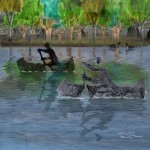 Desertion (on SoJo)
Desertion (on SoJo)
Meditation: When a child dies, he becomes incessantly present.
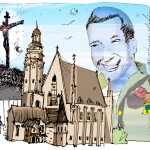 A Him to him (on SoJo)
A Him to him (on SoJo)
Meditation: A letter to Bach on the loss of my son.
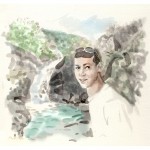 Other Nights (on SoJo)
Other Nights (on SoJo)
Meditation: The Seder, chamber music, and the death of my son.
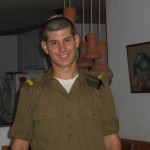 The Day of His Birth
The Day of His Birth
Meditation: On the death of my son.






Very beautiful, very sad, Haim. Hamakom yinachem etchem…
How could I say something, use words that aren’t mine and won’t be yours…..
Thank you dearest CHAIM for your thoughts , your feelings, the way you’re able and willing to express!!
It generates a feeling of deep love inside me.